
2-19-2005
by Justin Couture
A Long Name for a Revolutionary Powertrain
For the 2005 Geneva Motor Show, Mercedes-Benz's theme was diesel power. The show marked the three-pointed star's 70th anniversary
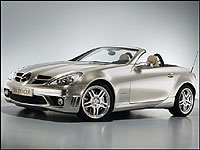 |
| The 2005 Geneva Motor Show marked Mercedes-Benz' 70th anniversary of producing diesel-powered cars, and they decided to celebrate with something special. (Photo: Mercedes-Benz Canada) |
Headlining the show was a 2005 SLK-class roadster. While the car in stock 3.5-litre gasoline powered form has received great praise, the vehicle is hardly headline-making news anymore as it's been in production for nearly a year. Likewise, the concept shown at the Geneva show looked no different than a 2005 SLK 55 AMG with multi-spoke wheels and the AMG body kit. Inside, it was trimmed with the same materials and
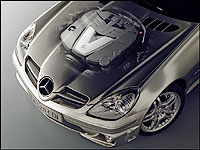 |
| The SLK 320 CDI Tri-Turbo Vision is powered by an all-new 3.0-litre common-rail diesel V6 with four valves per cylinder. (Photo: Mercedes-Benz Canada) |
The SLK 320 CDI Tri-Turbo Vision (Mercedes-Benz slang for concept) is powered by an all-new 3.0-litre common-rail diesel V6 with four valves per cylinder, which was also debuted at the show for use in the CLK, E-Class, M-Class and C-Class. This special concept, however, features three turbochargers in order to minimize turbo lag, maximize performance and demonstrate the potential of advanced diesel technology.
Benz likens the Tri-Turbo forced induction system to a sort of two-stage supercharger for its diesel engine. The three
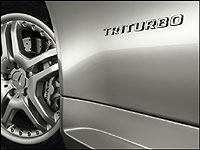 |
| Three turbochargers minimize turbo lag, maximize performance and demonstrate the potential of advanced diesel technology. (Photo: Mercedes-Benz Canada) |
At lower engine speeds, all three turbochargers spin to produce power, but most of the work is done by the quick-spooling, lower-pressure smaller turbos. When engine speeds rise and a more constant air flow supply is created, the workload is shifted to the larger turbo, which supplies greater boost and a massive wave of torque. The two smaller turbos are then shut down via a bypass system. To meet the demands of the high-performance engine, a larger
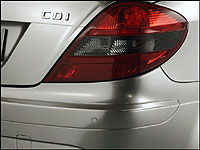 |
| With a top speed that's electronically limited to 250 km/h (155 mph), the diesel SLK is about as fast as oil burners come. (Photo: Mercedes-Benz Canada) |
The specs associated with this 3.0-litre powerplant are nothing short of phenomenal. Benz rates the engine at 286 horsepower, which is only slightly greater output than its stock SLK350 provides, but torque is rated at an amazing 464 lb-ft, which is enough to propel the compact SLK to 100 km/h in a scant 5.3 seconds, just 0.4 seconds slower than the gasoline V8-powered SLK 55 AMG. Equally impressive is the Tri-Turbo's standing kilometre dash, which is achieved in a mere 24.4 seconds. With a top speed that's electronically limited to 250 km/h (155 mph), the diesel SLK is about as fast as oil burners come.
Compared to the production variant of this very engine, which features one
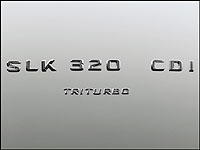 |
| Leopold Mukulic, the man in charge of Benz's engine development, said that the Tri-Turbo engine was a breakthrough in diesel performance. (Photo: Mercedes-Benz Canada) |
Aside from delivering credible driving performance, the SLK concept diesel also returns in fuel consumption, averaging a mere 7.5 L/100 km, for a mix of city and highway driving. Compared to the SLK 350's 10.6 L/100 km average consumption, and the SLK 55 AMG's 12.0 L/100 km,
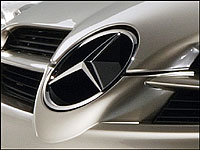 |
| While the cost prohibits the Tri-Turbo engine from being mass produced, at least for now, it doesn't rule out a limited or specialty run. (Photo: Mercedes-Benz Canada) |
Leopold Mukulic, the man in charge of Benz's engine development, said that the Tri-Turbo engine was a breakthrough in diesel performance. He added, "We're confident about its ability in a production environment, but the cost of assembly is extremely high." While the cost prohibits the Tri-Turbo engine from being mass produced, at least for now, it doesn't rule out a limited or specialty run.
Hmmm... a potential diesel-powered AMG SLK? Regardless of whether or not the engine will see the light of day, Rudolph, no doubt, would have been proud.
Specifications: